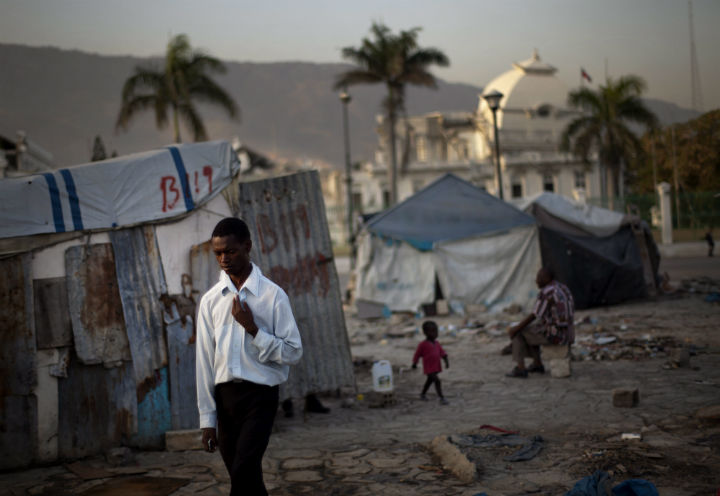Hundreds of millions of dollars in donations were raised to provide relief for Haitians who survived the catastrophic 2010 earthquake, but only resulted in the construction of six permanent homes, according to a report.

That’s the revelation from a year-long ProPublica and NPR investigation into how the American Red Cross spent nearly half a billion dollars in donation money — more than five years after the quake hit.
“The Red Cross says it has provided homes to more than 130,000 people. But the actual number of permanent homes the group has built in all of Haiti: six,” ProPublica’s Justin Elliott and NPR’s Laura Sullivan wrote.
Of the $488 million raised, in the aftermath of the magnitude-7.0 quake that killed than 230,000 people, $170 million was meant for shelter.
READ MORE: Five years later, aid workers admit slow recovery from Haiti earthquake
Travelling to the community of Campeche, in capital city Port-au-Prince, the journalists found residents to be living in ramshackle huts and without electricity, drinking water or basic sanitation.
Campeche was where the Red Cross was meant to work on one of its “signature projects,” but the head of a local community group told ProPublica and NPR the changes promised — a proposed 700 homes that were due to be completed in 2013 — have yet to materialize.
“I do not understand the change that they are talking about. I think the Red Cross is working for themselves,” Jean Jean Flaubert told the reporters.
The American Red Cross contests the report’s claims, saying the organization has “made a difference in the lives of millions of Haitians” in the five years since the earthquake hit.
“The Red Cross is disappointed, once again, by the lack of balance, context and accuracy in the most recent reporting by ProPublica/NPR, which follows the pattern of all their previous Red Cross stories,” a statement on the American Red Cross website read. “It is particularly disappointing to see our work misrepresented considering we answered more than 100 questions in writing and provided an interview with the head of our international programs.”
The statement added that donor contributions have gone towards the construction and operation of eight hospitals and clinics, making clean water and sanitation available and to help stop the spread of a cholera outbreak that has killed more than 8,000 people in the past four-and-a-half years.
The Red Cross argued it also moved “more than 100,000 people out of make-shift tents into safe and improved housing.
“When land was not available for new homes, the Red Cross provided a range of housing solutions including rental subsidies, repairs and retrofitting of existing structures, fulfilling our promise to ensure tens of thousands of Haitians are back in homes. We also built and repaired schools, roadways and water distribution points vital to neighborhoods.”
Andrew Hopkins, a spokesperson for the Canadian Red Cross, told Global News the organization works independently of the American Red Cross and had its own geographical area of focus in the post-earthquake recovery efforts. He said the Canadian Red Cross built 7,500 homes, in Jacamel and Leogane, as well as provided shelter repair and rental assistance for those affected by the quake.
READ MORE: Then and now: Haiti marks 5th anniversary of earthquake
The American Red Cross also stated more than 90 per cent of its staff, since recovery efforts began, have been Haitian.
“The American Red Cross has hired some international staff with expertise in major disaster recovery and their benefit package is in line with the international humanitarian sector.”
But the report, published Wednesday, claims there was an “an overreliance on foreigners who could not speak French or Creole,” according to current and former Red Cross employees.
And there also appeared to be little faith in local labour from some national employees within the Red Cross, at least when it came to taking charge of the organization’s redevelopment goals.
“The implication that talented, smart, competent Haitians cannot be found in Haiti has to be dispelled, if we are going to give Haitians a chance to be part of rebuilding Haiti,” Judith St. Fort, the former head of the American Red Cross’ Haiti program, wrote in 2011 memo criticizing comments made by Red Cross staff.
The “overreliance” on foreigners alleged in the ProPublica/NPR article, lead the Red Cross rebuilding projects added up, the article alleged.
“According to an internal Red Cross budgeting document for the project in Campeche, the project manager – a position reserved for an expatriate – was entitled to allowances for housing, food and other expenses, home leave trips, R&R four times a year, and relocation expenses. In all, it added up to $140,000,” ProPublica and NPR reported. “Compensation for a senior Haitian engineer — the top local position — was less than one-third of that, $42,000 a year.”
The Haitians who did work for the Red Cross in less senior positions didn’t get the same benefits as their foreign counterparts.
One of the Haitians who did administration work for the Red Cross in Haiti was Shelim Dorval. He explained how the donation money wound up going back into the pockets of Americans when it was meant for Haiti.
“For each one of those expats, they were having high salaries, staying in a fancy house, and getting vacation trips back to their countries,” Dorval told the reporters. “A lot of money was spent on those people who were not Haitian, who had nothing to do with Haiti.”
The ProPublica/NPR report detailed how a promise to spend 91 cents of every dollar raised on Haiti recovery and rebuilding and just 9 per cent on overhead, didn’t add up.
The Red Cross said the pace of progress may not have been as quick as it would have liked, but “Haiti is better off today than it was five years ago.”


Comments